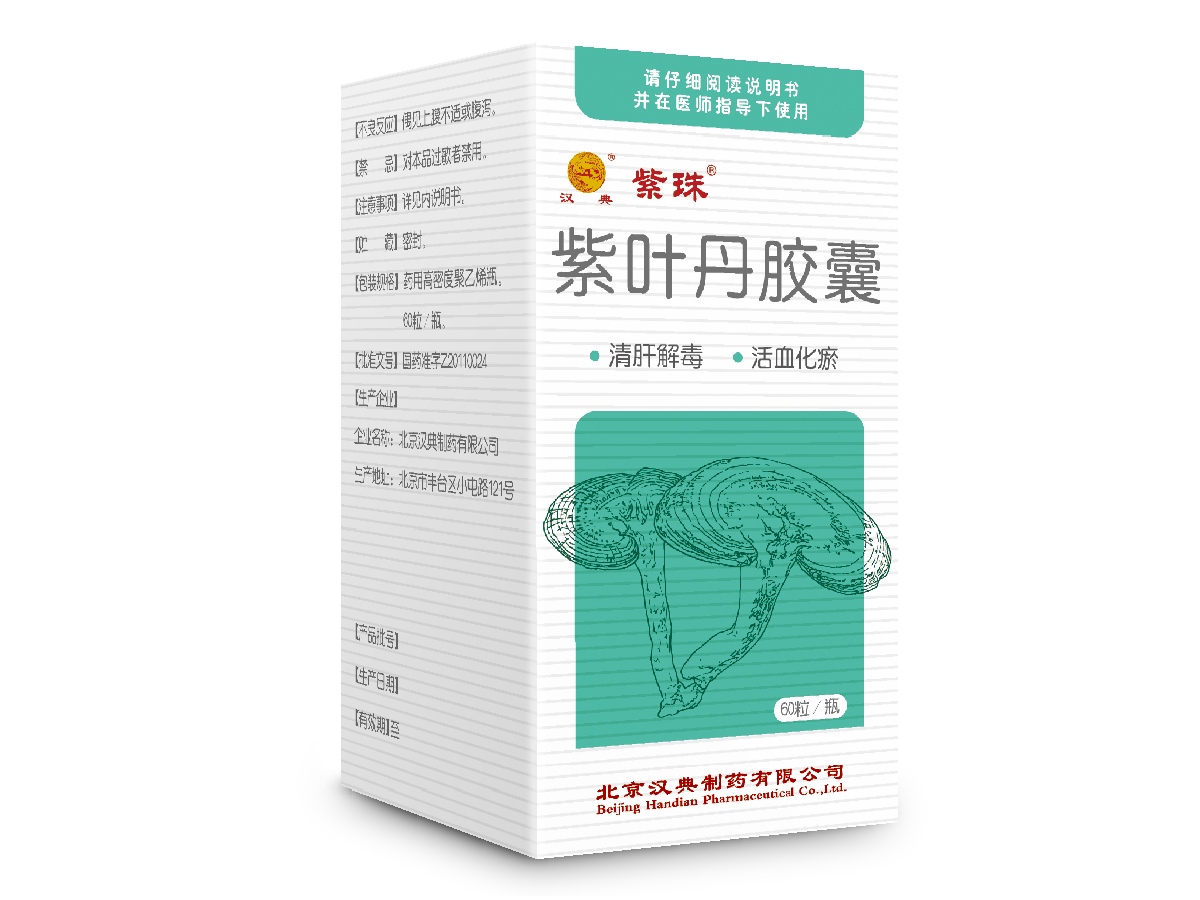
More pictures show >>
【Medicine name】Ziyedan Jiaonang
【Ingredients】Phyllanthus urinaria 、Coriolus、Salviae Miltiorrhizae Radix Et Rhizoma、Arnebiae Radix.
【Properties】This product is capsule agent, the content is grayish brown to tan powder or particles; The air is slightly fragrant and the taste is slightly sour.
【Major function】Clear liver detoxification, invigorate blood and remove blood stasis. It is used for chronic viral hepatitis b dialectic with dampness and heat and qi deficiency and blood stasis. Symptoms: abdominal distension, flank pain, loss of appetite, weakness of the mouth, etc.
【Specification】Each grain in 0.5 g.
【Usage & Dosage】Oral. 5 pills at a time, 3 times a day, 24 weeks for a course of treatment.
【Side effects】None
【Taboo】None
【Attentions】None
【Storage】Sealed.
【Validity period】 24 months.
Q1. What are the indications (major functions) of Zizhu?
Zizhu has the effect of clearing liver-fire, detoxifying, promoting blood circulation and removing blood stasis. It is mainly indicated for chronic hepatitis B with syndromes of damp heat, qi deficiency and blood stasis. According to the theory of TCM, a majority of patients with chronic hepatitis B suffer from dampness. The dampness pathogen turns into heat and consumes qi in the body over time, leading to qi deficiency and blood stasis. Several representative symptoms are described as follows: body – physical difficulty, fatigue or poor appetite; personality – non-cheerful personality; urination and defecation – yellow urine or sticky and uncomfortable stools; and tongue coating - generally yellow or greasy with petechiae, ecchymoses, etc.
Q2. What is the mechanism of action (TCM) of Zizhu?
The components of Ziyedan include Yexiazhu (phyllanthus urinaria), Yunzhi (coriolus versicolor), Danshen (salvia miltiorrhiza) and Zicao (comfrey). The name of Ziyedan is composed of the first letter of Zicao, Yexiazhu and Danshen. The pathogenesis of persistent chronic liver diseases is mostly yin-deficiency in the liver and kidney. The pathogen immersed in the blood is coalesced, greasy and stagnated, leading to liver-qi heat stagnation, or even liver dysfunction, liver blood stais, yin fluid consumption, heat toxicity retention, qi deficiency, and irregular qi and blood. According to the analysis of the above pathogenesis, the principle of clearing away heat, detoxifying, strengthening body resistance and eliminating evil, activating blood and removing blood stasis is applied. Yexiazhu is sweet and bitter in taste and cold in nature. It enters the liver and lung meridian to soothe the liver, clear heat, alleviate water detention and detoxify. It is used as the monarch drug in this prescription. Yuzhi is sweet in taste and neutral in nature. It has the effects of nourishing qi and yin, strengthening body resistance and eliminating evil, and regulating yin and yang. It is the minister drug. The monarch drug used for detoxification to dispel evil should act together with the minister drug that is indicated for nourishing yin to strengthen the body resistance. Danshen is bitter in taste and slightly cold in nature. It enters and heart and liver meridian to clear Ying heat, cool the blood and promote blood circulation. It is used as an adjuvant and envoy drug in this prescription for activating blood circulation to remove blood stasis and relieving swelling and pain. Zicao is bitter and salt in taste and cold in nature. It also enters the heart and liver meridian to cool the blood, promote blood circulation and carry out detoxification. The drug used here is compatible with Yexiazhu, which not only exerts the effect of clearing away heat, cooling blood and detoxifying, but also promotes blood circulation to remove stasis. It is also an adjuvant and envoy drug.
Q3. How to use Zizhu?
Zizhu is packaged in a box of 60 capsules (0.5g per capsule). The dose is 5 capsules, 3 times daily. A box contains the capsules for 4 days. Patients with chronic hepatitis B should take the product for 6 months (24 weeks) as a course of treatment.
Q4. Is Zizhu safe?
The clinical application of Ziyedan shows that only a minority of patients have mild gastrointestinal reactions during treatment and follow-up. No serious adverse events have occurred, and the incidence of adverse reactions is extremely low, indicating that Ziyedan is quite safe.